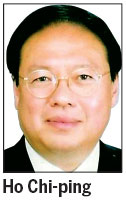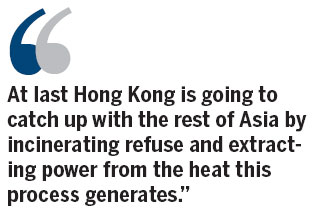Is HK to become 'Asia's Naples'?
Updated: 2013-07-11 06:05
By Ho Chi-ping(HK Edition)
|
|||||||
Just a few weeks ago, Secretary for the Environment Wong Kam-sing announced a blueprint that envisions the setting up of much overdue waste-to-energy facilities to supplement the landfill method of dumping, which we employ to dispose of about half of our refuse. Since waste disposal has long been a hot topic in Hong Kong, we were heartened when he pointed out that the use of new technology would enable waste-to-energy plants to provide clean operations while transforming waste into a usable resource. That's good news, we thought - at last Hong Kong is going to catch up with the rest of Asia by incinerating refuse and extracting power from the heat this process generates. But his announcement added this cautionary note: We are now at a stage to engage the public to talk about the details of implementation, including the level of charge. Isn't it time we "walked the walk", not "talked the talk"?

Indeed, there has been a lot of talk lately about our waste crisis - very angry talk in the Legislative Council. Because the government wants to expand two of our three remaining landfills so that still more rubbish can be dumped into them, and rebellious councillors didn't want to authorize the required funds. And just look at the amounts involved - no less than a hair-raising HK$7 billion to expand the Ta Kwu Ling landfill, plus HK$35 million for a "study" on ways to enlarge the Tuen Mun landfill.
About the only plus factor concerning our landfills is that 13 of them were closed between 1996 and 2006, with most of them converted into ecological parks, multi-purpose grass pitches, rest centers and golf courses. The former Ma Tso Lung landfill in North District is now a recreation center for the Tung Wah Group of Hospitals while the former Tsang Kwan Ho eyesore in Sai Kung, closed in 1999, is to become a football academy and driving range.
Returning to the concept of incinerating our rubbish and deriving energy from the heat, why didn't we try this solution many years ago? Let's turn back the clock by 21 years and see what our humble little neighbor Macao did then about its ever-growing problem of refuse disposal. In 1992, it set up the Macao Incineration Plant that used three incinerators to dispose of domestic and medical waste, transformed the heat into power and fed that power into the electricity grid. Then in 2006, when the throughput at the plant was nudging 300,000 tons a year, Macao very sensibly put in three more incinerators to double the plant's capacity to 1,800 tons a day, or 657,000 tons a year.
Highly conscious of the dangers of pollution in the city's overcrowded environment, Macao also went to great pains to ensure that the plant would operate in accord with European Union emission standards, and so it is safely sited on Taipa Island, though still less than a kilometer from multi-story blocks of flats.

Similar plants that incinerate household refuse and turn the resultant heat into energy have been operating for decades in progressive cities around Asia. They can be found in several of the biggest cities in Japan plus Seoul and Singapore. Furthermore, in Japan, operations are so environmentally clean that municipal authorities build civic centers next to the plants complete with libraries, meeting halls and even swimming pools that are heated in winter - all thanks to the adjoining incinerators.
And yet Hong Kong, which prides itself on its get-up-and-go approach to every problem, is only just now (to re-quote the environment secretary) "at a stage to engage the public to talk about the details of implementation."
Since the government has for so long "fiddled" while nothing has burned, should it admit defeat and consider turning the problem over to the private sector before Hong Kong becomes the "Naples" of Asia? In 2007, the landfills of Naples were so badly overflowing with garbage and other rotting refuse that municipal workers would not pick up any more rubbish from the streets to add to the filthy mess. The result: Piles of rubbish all across Naples completely blocking some footpaths. Today, Naples is no longer one of Italy's favorite tourist destinations. The few unsuspecting visitors who arrive are soon clasping their noses and hurrying back to the railway station to get away from the stench.
Meanwhile, not everybody in Hong Kong moves at a snail's pace when it comes to deriving energy from trash. Its' noteworthy that a consortium headed by Li Ka-shing recently offered $1.26 billion for the Dutch waste treatment company AVR, The Netherlands' biggest "waste to energy" company that - yes, you guessed it - recycles refuse to generate power. Also, in January, Li's Cheung Kong investment group stumped up $501 million for New Zealand's EnviroWaste operation, which also produces energy from junk besides managing landfills.
Isn't there a "hot tip" in all this for Hong Kong?
The author is vice-chairman and secretary-general of China Energy Fund Committee.
(HK Edition 07/11/2013 page9)